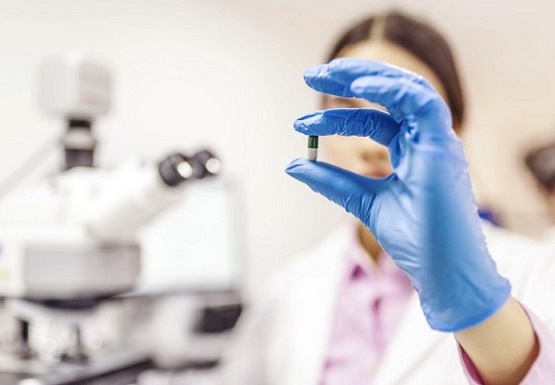Development of Stable Maleimide Functionalized Peptidoliposomes Against SARS-CoV-2
Nikhil Prasad Fact checked by:Thailand Medical News Team Feb 20, 2025 1 month, 3 weeks, 4 hours, 33 minutes ago
Medical News: A Promising New Approach to COVID-19 Treatment
A team of researchers from the University of Wrocław, Wrocław University of Science and Technology, Silesian Park of Medical Technology Kardio-Med Silesia, Acellmed Ltd., and Regional Specialist Hospital in Wrocław has developed a novel drug delivery system that may help combat COVID-19 more effectively. Their study focuses on maleimide-functionalized peptidoliposomes, a specialized type of nanocarrier designed to neutralize the SARS-CoV-2 virus. This
Medical News report delves into the key findings of this research, shedding light on how this innovation could play a crucial role in fighting the ongoing pandemic.
 Development of Stable Maleimide Functionalized Peptidoliposomes Against SARS-CoV-2
Why New Treatments Are Needed
Development of Stable Maleimide Functionalized Peptidoliposomes Against SARS-CoV-2
Why New Treatments Are Needed
Despite extensive global efforts, only a handful of COVID-19 treatments have been successfully developed and approved for widespread use.There remains a need for alternative therapeutic solutions, especially for vulnerable populations. The constantly evolving nature of SARS-CoV-2 means that many antiviral drugs and monoclonal antibody treatments lose their effectiveness over time. This challenge has driven researchers to explore new ways to block the virus from infecting human cells.
How Peptidoliposomes Work
Peptidoliposomes are tiny, lipid-based nanoparticles designed to deliver specialized peptides that can attach to and neutralize the SARS-CoV-2 virus. These nanoparticles are coated with a maleimide functional group, which allows for the stable attachment of peptides that mimic the virus’s natural binding sites. When introduced into the body, these peptidoliposomes act as decoy receptors, luring the virus away from healthy cells and preventing it from spreading further.
Key Study Findings
The research focused on optimizing the formulation and stability of these peptidoliposomes to ensure they could be safely and effectively used as a treatment. Several important findings emerged from the study:
-Liposome Composition: The researchers tested 19 different lipid compositions to determine the most stable formulation. The final version included a balance of phosphatidylcholine, cholesterol, and polyethylene glycol (PEG)-modified lipids to ensure optimal drug delivery.
-Size and Stability: The liposomes were carefully calibrated to be small and uniform, ensuring effective delivery while remaining stable in storage conditions. The most stable formulations maintained their structure for over six months at low temperatures.
-Improved Drug Delivery Efficiency: The presence of maleimide groups on the liposome surface enhanced the ability of these nanoparticles to attach to their target, increasing their effectiveness in neutralizing the virus.
-Peptide Attachment Optimization: The study also explored the best condit
ions for attaching peptides to the liposomes, finding that a 5% concentration of maleimide-functionalized lipids provided the best balance of effectiveness and cost.
-Potential for Future Applications: While the primary focus was on COVID-19, the study suggests that these peptidoliposomes could serve as a universal platform for treating a wide range of viral infections.
What This Means for COVID-19 Treatment
This innovative approach offers several advantages over existing treatments. Unlike traditional antivirals that target specific virus proteins - making them susceptible to mutations - peptidoliposomes could remain effective even as new variants emerge. Additionally, since these nanoparticles mimic natural cellular receptors, they have the potential to be less toxic and more tolerable for patients compared to some antiviral drugs.
Moreover, the researchers believe that peptidoliposomes could be administered via inhalation, making them a convenient and non-invasive treatment option for COVID-19 patients. This delivery method would allow the drug to reach the lungs directly, where the virus primarily causes damage, improving treatment efficiency.
Future Prospects and Clinical Trials
While the study presents promising laboratory results, further clinical trials will be necessary to determine whether this technology is safe and effective in humans. The research team is now looking at ways to scale up production and refine the formulation for real-world applications. If successful, peptidoliposomes could become a powerful tool in managing future pandemics and respiratory viral infections.
The study findings were published in the peer-reviewed International Journal of Molecular Sciences.
https://www.mdpi.com/1422-0067/26/4/1629
For the latest COVID-19 News, keep on logging to Thailand
Medical News.
Read Also:
https://www.thailandmedical.news/news/u-s-nih-discovers-new-potential-antivirals-against-sars-cov-2-involving-p97-inhibitors
https://www.thailandmedical.news/news/the-broad-antiviral-potential-of-the-tcm-decoction-fuzheng-jied-against-various-coronaviruses-including-sars-cov-2
https://www.thailandmedical.news/news/french-study-finds-that-a-phytochemical-from-st-john-s-wort-shows-promise-as-a-broad-spectrum-antiviral-against-coronaviruses
https://www.thailandmedical.news/pages/thailand_doctors_listings
